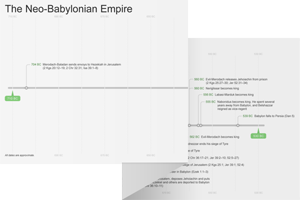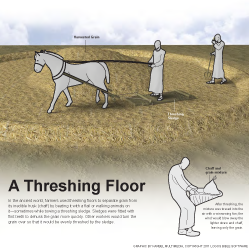4:1–3 These verses are nearly identical to Isa 2:2–4. The similarity is likely the result of Micah’s use of Isaiah’s material, but it is possible that both Micah and Isaiah used a well-known prophetic tradition. See note on Isa 2:1–5. |
4:1 the end of those days This phrase is used to designate a future time when the nation will repent and Yahweh will restore the prosperity of Israel (see Deut 4:30; Isa 2:2; Hos 3:5; Dan 10:14; note on Isa 2:2).
the mountain of the house of Yahweh Mount Zion, where the temple stood.
the highest of Jerusalem will be the chief mountain in terms of authority and importance.
will be lifted up above the hills Jerusalem will be elevated above all other kingdoms (compare Rev 21:2.
people will stream to it There will be a steady stream of people coming to Jerusalem to worship Yahweh. Salvation will one day be available to all peoples.
4:2 his paths The way of righteousness that is practiced by obeying the Law.
4:3 he will judge between many peoples Yahweh will serve as the judge of all nations.
they will beat their swords Swords will no longer be needed because there will be worldwide peace. This verse contrasts times of war, when plowshares are fashioned into swords and pruning hooks into spears (see Joel 3:10; note on Isa 2:4).
plowshares A sharp iron blade attached to the beam of a plow. The blessings of the Messiah will include abundant harvests (see Joel 2:22–26).
into pruning hooks A type of knife used for pruning and harvesting grapevines.
4:4 each under his vine Meaning they shall sit in peace.
fig tree This tree would provide abundant shade with its large palm-shaped leaves. Primarily because of this passage, it became customary in Israel to pray under fig trees for the coming of the Messiah (see John 1:48–50; note on Jer 24:1).
4:5 all the nations walk, each in the name of its god Foreign nations each worshiped their own gods. At the end of the age, all nations will worship Yahweh (see Micah 4:1–3).
4:6 that day Referring to the Day of Yahweh.
4:7 a remnant Those who will be gathered to the land of Israel (see 2:12; 4:6).
strong The Hebrew term used here denotes strength, but could also be used in the sense of numerous.
4:8 O Migdal-Eder This verse refers to a watchtower that overlooks a flock of sheep. It is set in apposition to the hill (or stronghold) of the daughter of Zion (see 1:13 and note), meaning they both refer to the same thing—Jerusalem. The remnant is likened to a flock of sheep in 2:12.
the former dominion Refers to a previous era in which Israel experienced great prosperity under a king (e.g., the period of David and Solomon).
the daughter of Jerusalem A synonym for daughter of Zion.
4:9 Is there no king in you Israel will soon experience a period during which the nation will have no king. Compare Jer 8:19.
your counselor The Hebrew word used here is parallel to “king” and refers to wise, capable advisors. The title is used of the Messiah in Isa 9:6. Elsewhere, it refers to the leaders that provide the skills necessary for government to function (Isa 3:3; 41:28; Prov 11:14).
that pangs like a woman in labor have seized you The period during which Israel has no king will be a time of excruciating pain, similar to a woman experiencing labor pains. The nation could experience rebirth only after a time of painful labor.
4:10 the city Refers to Jerusalem.
you will camp in the field The nation will live in exile.
you will go to Babylon This prophecy is fulfilled in 586 bc when Jerusalem falls and many of the people are taken into exile.
Babylon |
will redeem The Hebrew word used here is related to the term used for the kinsman-redeemer (see note on Deut 19:6).
 Go’el Word Study
Go’el Word Study
4:11 against you The nations will celebrate the fall of Jerusalem, not understanding that Israel’s exile is all part of God’s plan (see Micah 4:12).
4:12 they do not know Refers to the nations of v. 11.
they do not understand his plan Synonymous parallelism is used here.
to his threshing floor A site where harvested grain is brought to be threshed, either by the use of a flail or a threshing sledge. Threshing is a somewhat violent process, an apt illustration of Yahweh’s judgment of His people.
is a somewhat violent process, an apt illustration of Yahweh’s judgment of His people.
he has gathered them as sheaves A sheaf is harvested grain bound in a bundle. Sheaves are brought to a threshing floor to have the grain dislodged from the stalk.
4:13 your horn I will make as iron The strongest and hardest metal known in ancient times.
horn An animal’s horn was the symbol of its strength. See note on Ezek 29:21.
was the symbol of its strength. See note on Ezek 29:21.
bronze A metal alloy created by combining copper and tin.
hooves Animals were commonly used in the threshing process to stomp on sheaves with their hoofs to dislodge grain.
you will break many peoples in pieces A reference to threshing (see note on Micah 4:12). Those who had been threshed (i.e., Israelites) are now doing the threshing.
the Lord of the whole earth Yahweh will rule over the entire earth (see Zech 14:9).

|
About Faithlife Study BibleFaithlife Study Bible (FSB) is your guide to the ancient world of the Old and New Testaments, with study notes and articles that draw from a wide range of academic research. FSB helps you learn how to think about interpretation methods and issues so that you can gain a deeper understanding of the text. |
| Copyright |
Copyright 2012 Logos Bible Software. |
| Support Info | fsb |
 Loading…
Loading…


 Babylon
Babylon 